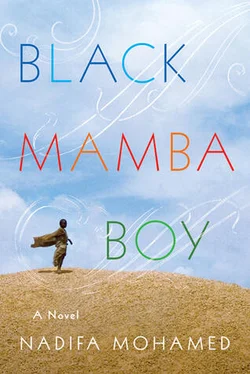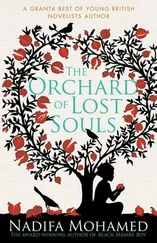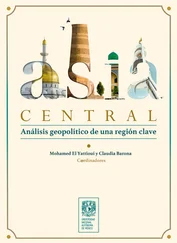He stood up with a roar. “Soobah! Come out,” he yelled. Only a child would play like this, he thought. He stood stiffly, chest out ready to fight. A hand waved out from behind a tree, but Jama didn’t move.
A man in white Somali robes came out into the open and smiled. He looked familiar. Jama squinted at the face, trying to place it.
“What do you want?” Jama shouted over.
“Don’t you recognize me?” With a sad smile the dark figure beckoned for Jama to follow. Jama picked up a jagged rock and followed the apparition; they didn’t talk.
It took Jama a long time before he accepted who had that dancing stride, those long fingers that clicked gently with every step, that face that carried the blueprint of his own. “Father, it’s too late,” Jama said.
Guure led Jama away from soldiers, crocodiles, leopards, to sanctuary; it was all he ever would do for his son. Jama cried when the apparition disappeared near a burnt-out village, and he searched amid the scorched tukuls, stepped over cold ashes, spilled pots, and lost shoes. He entered the skeleton of a hut, only to jerk back at the sight of a young child cowering in the corner. Jama turned to run away from this village of ghosts but the young boy ran after him, grasping at his shorts. Jama stopped and looked at the boy, whose ribs hung out, the skin on his old-man face loose and his eyes like two large moons, he was definitely alive. Jama opened his knapsack, retrieved flour and his water flask, stoked up a fire, and began to prepare bread. While he worked, the child stuck to his side. He had finished the water in the flask, and now silently watched the bread take form. Jama felt no warmth emanate from him. As soon as the bread was cooked, the boy grabbed it from the fire.
He could not have been older than seven. Jama shook his head and asked, “Why are you here?” The boy was still laboriously eating the bread.
“I am waiting for my family to come back.”
Jama had not seen civilians for days. “They won’t come back,” he said flatly, holding out his hand for the boy.
“What is your name?” Jama asked as the boy put his small cold hand in his grip.
“Awate,” he replied.
“Come with me, Awate, I’ll take you somewhere safe,” Jama said, unable to leave this small human spirit in the dead village that his father had led him to. Awate knew of a town nearby and directed Jama as he carried him on his back, holding him too tightly around the neck. Awate had been playing in the woods when bombs had fallen on the village, and had run back to his tukul to find his mother and brothers gone; he had been alone for days and he clung now like a leech to Jama’s skin.
Jama and Awate fled into the lowlands around the Gash River. In a few days they had left behind the rubble and burnt vehicles and reached the date palms of Tessenei. British soldiers had taken control of Italian East Africa, so Jama threw away his army papers before lining up at the checkpoint. Jama went to the river, bathed his feet, closed his eyes, and rested on the quiet bank. He tied weights to the images of corpses, burning men, and lost eyes lodged in his mind, and plunged them to the bottom of the river.
GERSET, ERITREA, JULY 1941
Jama waited a long time for Abdi, hoping that he would come around the bend one day, a little dusty, a little thirsty, but otherwise well. Sometimes casualties were brought to Tessenei on stretchers after stepping on mines or triggering booby traps. Jama would rush out of the shop to see the victim’s face but they were always high-cheekboned Eritreans. Jama wanted to search for Abdi, but the countryside was now a battleground for militias and shifta bandits. Shidane’s grave was a meeting place for robbers who gathered under his shade to share their loot. Jama wondered if Shidane’s ghost had called them to him, his spirit sitting beside them in delight as they counted and plotted. After bandits attacked Hakim’s shop, shoving their pistols into Jama’s face and grabbing sacks of grain and money, Jama remonstrated with Shidane, and they never returned. Ordinary Eritreans were also in a rebellious mood now that Italian power had been revealed as nothing more than a magician’s trick. Every man and boy had a pistol, rifle, or grenade. When Italian prisoners of war passed through Tessenei they hid their faces from the men they had tortured and the women they had raped. Even after the carnage at Keren, the ascendancy of the European was jealously guarded by the British, who pampered the Italians and protected them from any vengeance. When bandits attacked Italian villas or shops, British troops conducted house-to-house searches until weapons and suspects were handed over.
Jama lived a simple existence in Hakim’s shop, quietly watching the world pass by, everyday routines, miracles, and tragedies filling his days. He felt no joy or misery, just a deep yearning for all the things he had lost. The war was over but it had taken everything with it, and reduced his world to an oasis of peace surrounded by a scorched wasteland. Former askaris came to the store and made chitchat with him, some drank too much, some pretended to have forgotten all about the war but still there was the never-ending inventory of lost souls. “So-and-so died of shrapnel wounds”; “Tall Mohamed was hanged”; “Hassan was ambushed by shifta”; “Samatar went missing.” Jama could not stop listening even though he was sick of death; he wanted life in its purest form, like birds had, not this stunted thing that the askaris endured. Jama asked the men to look out for Abdi and to tell him that Jama Guure was waiting for him in Tessenei, but Abdi had disappeared, flown away on invisible wings.
Jama listened to the neighbor’s cockerel sound its alarm, its crowing muffled by the other morning sounds, buckets of water sloshing, fires crackling, men and women greeting one another, mules braying, babies crying. Hawa, an old woman wrapped in red cotton, came limping into the store. She heaved and panted, on her back a sack of chickpeas, and her muscular arms threw the heavy load at Jama’s feet.
“Good peas, the best I’ve grown in a while. I’ll want a special gift from you, my little Somali,” she said, holding out her hand.
“If I were the boss, you could have anything in the shop, aunty.”
Hawa waited for Jama to weigh the sack and hand over her payment of sugar. He was always generous, giving an extra spoonful to his regulars. Hawa tweaked his cheek and placed the packet under her arm. It would take another hour for her to walk back to Gerset and her home in the Kunama settlement. The sky was clouded over, threatening a downpour.
“Stay here, Hawa, wait for it to come and go,” said Jama, lighting a cigarette, phosphorus and tobacco sharp in his nose.
Hawa trundled back to him, closing her eyes to breathe in the smoke. “Give me one, you naughty Somali, or I will report you to the boss.”
Jama broke the cigarette in half and gave her the lit end. “It’s the last one,” he said apologetically.
He thrust the other half behind his ear and checked for rotten fruit in the piles delivered by local farmers that morning. Most of the bananas and oranges were stunted little specimens, bruised and misshapen. He removed the ones that were overripe and shared them with Hawa. As they ate, the rain began, the first real downpour of the rainy season, and the wind blew in, spraying them with water. Awate came running in on his way home from the schoolhouse. He was drenched, his thin clothes plastered to his body.
“Jama, I came top in my class today. Teacher said if I carry on like this, he will send me to his brother’s big school in Kassala.”
Hawa ululated and smoke escaped in spirals from her mouth.
“Manshallah, Awate, you will go to Kassala, but dry yourself, you don’t want to get sick,” Jama admonished.
Читать дальше
Конец ознакомительного отрывка
Купить книгу












